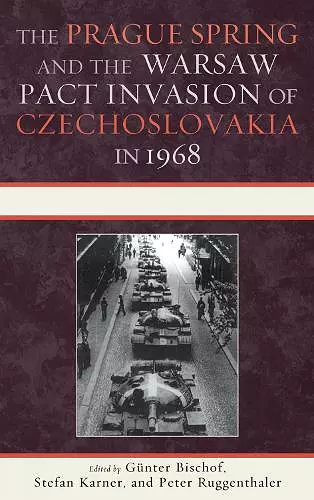The Prague Spring and the Warsaw Pact Invasion of Czechoslovakia in 1968
Peter Ruggenthaler editor Stefan Karner editor Gunter Bischof editor
Format:Hardback
Publisher:Lexington Books
Published:29th Dec '09
Currently unavailable, and unfortunately no date known when it will be back
This hardback is available in another edition too:
- Paperback£59.00(9780739143056)

On August 20, 1968, tens of thousands of Soviet and East European ground and air forces moved into Czechoslovakia and occupied the country in an attempt to end the "Prague Spring" reforms and restore an orthodox Communist regime. The leader of the Soviet Communist Party, Leonid Brezhnev, was initially reluctant to use military force and tried to pressure his counterpart in Czechoslovakia, Alexander Dubcek, to crack down. But during the summer of 1968, after several months of careful deliberations, the Soviet Politburo finally decide that military force was the only option left. A large invading force of Soviet, Polish, Hungarian, and Bulgarian troops received final orders to move into Czechoslovakia; within 24 hours they had established complete military control of Czechoslovakia, bringing an end to hopes for "socialism with a human face." Dubcek and most of the other Czechoslovak reformers were temporarily restored to power, but their role from late August 1968 through April 1969 was to reverse many of the reforms that had been adopted. In April 1969, Dubchek was forced to step down for good, bringing a final end to the Prague Spring. Soviet leaders justified the invasion of Czechoslovakia by claiming that "the fate of any socialist country is the common affair of all socialist countries" and that the Soviet Union had both a "right" and a "sacred duty" to "defend socialism" in Czechoslovakia. The invasion caused some divisions within the Communist world, but overall the use of large-scale force proved remarkably successful in achieving Soviet goals. The United States and its NATO allies protested but refrained from direct military action and covert operations to counter the Soviet-led incursion into Czechoslovakia. The essays of a dozen leading European and American Cold War historians analyze this turning point in the Cold War in light of new documentary evidence from the archives of two dozen countries and explain what happened behind the scenes. They also reassess the weak response of the United S
The detail of negotiation in the ideological Cold War context is fascinating in these universally well-written/translated essays. Indispensable for any library with even a bare-bones Cold War recollection.... Essential. * CHOICE, July 2010 *
Of the many books that have been trying to look at the 1968 Czechoslovak crisis from different perspectives, this is the first one to do so in a balanced way while using substantive new evidence as well. -- Vojtech Mastny, author of The Cold War and Soviet Insecurity: The Stalin Years
It is at the moment the best collection of international scholarship on Czechoslovakia and the outside powers, which reacted to the unusual phenomenon that blossomed under the name of Prague Spring in that country for several months in 1968. The volume has an elaborate structure as a result, in part, of its complicated creation. * Austrian History Yearbook *
Short but elegant. * Canadian Slavonic Papers *
- Winner of Choice Outstanding Academic Title 2010.
ISBN: 9780739143049
Dimensions: 245mm x 168mm x 35mm
Weight: 909g
530 pages